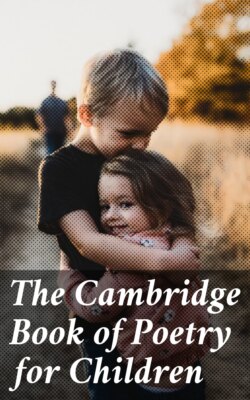Читать книгу The Cambridge Book of Poetry for Children - Various - Страница 3
На сайте Литреса книга снята с продажи.
PREFACE
ОглавлениеTable of Contents
IN compiling a selection of Poetry for Children, a conscientious Editor is bound to find himself confronted with limitations so numerous as to be almost disheartening. For he has to remember that his task is, not to provide simple examples of the whole range of English poetry, but to set up a wicket-gate giving attractive admission to that wide domain, with its woodland glades, its pasture and arable, its walled and scented gardens here and there, and so to its sunlit, and sometimes misty, mountain-tops—all to be more fully explored later by those who are tempted on by the first glimpse. And always he must be proclaiming to the small tourists that there is joy, light and fresh air in that delectable country.
Briefly, I think that blank verse generally, and the drama as a whole, may very well be left for readers of a riper age. Indeed, I believe that those who can ignore the plays of Shakespeare and his fellow-Elizabethans till they are sixteen will be no losers in the long run. The bulk, too, of seventeenth and eighteenth century poetry, bending under its burden of classical form and crowded classical allusion, requires a completed education and a wide range of reading for its proper appreciation.
Much else also is barred. There are the questions of subject, of archaic language and thought, and of occasional expression, which will occur to everyone. Then there is dialect, and here one has to remember that these poems are intended for use at the very time that a child is painfully acquiring a normal—often quite arbitrary—orthography. Is it fair to that child to hammer into him—perhaps literally—that porridge is spelt porridge, and next minute to present it to him, in an official ‘Reader,’ under the guise of parritch? I think not; and I have accordingly kept as far as possible to the normal, though at some loss of material.
In the output of those writers who have deliberately written for children, it is surprising how largely the subject of death is found to bulk. Dead fathers and mothers, dead brothers and sisters, dead uncles and aunts, dead puppies and kittens, dead birds, dead flowers, dead dolls—a compiler of Obituary Verse for the delight of children could make a fine fat volume with little difficulty. I have turned off this mournful tap of tears as far as possible, preferring that children should read of the joy of life, rather than revel in sentimental thrills of imagined bereavement.
There exists, moreover, any quantity of verse for children, which is merely verse and nothing more. It lacks the vital spark of heavenly flame, and is useless to a selector of Poetry. And then there is the whole corpus of verse—most of it of the present day—which is written about children, and this has even more carefully to be avoided. When the time comes that we send our parents to school, it will prove very useful to the compilers of their primers.
All these restrictions have necessarily led to two results. First, that this collection is chiefly lyrical—and that, after all, is no bad thing. Lyric verse may not be representative of the whole range of English poetry, but as an introduction to it, as a Wicket-gate, there is no better portal. The second result is, that it is but a small sheaf that these gleanings amount to; but for those children who frankly do not care for poetry it will be more than enough; and for those who love it and delight in it, no ‘selection’ could ever be sufficiently satisfying.
KENNETH GRAHAME.
October 1915.
